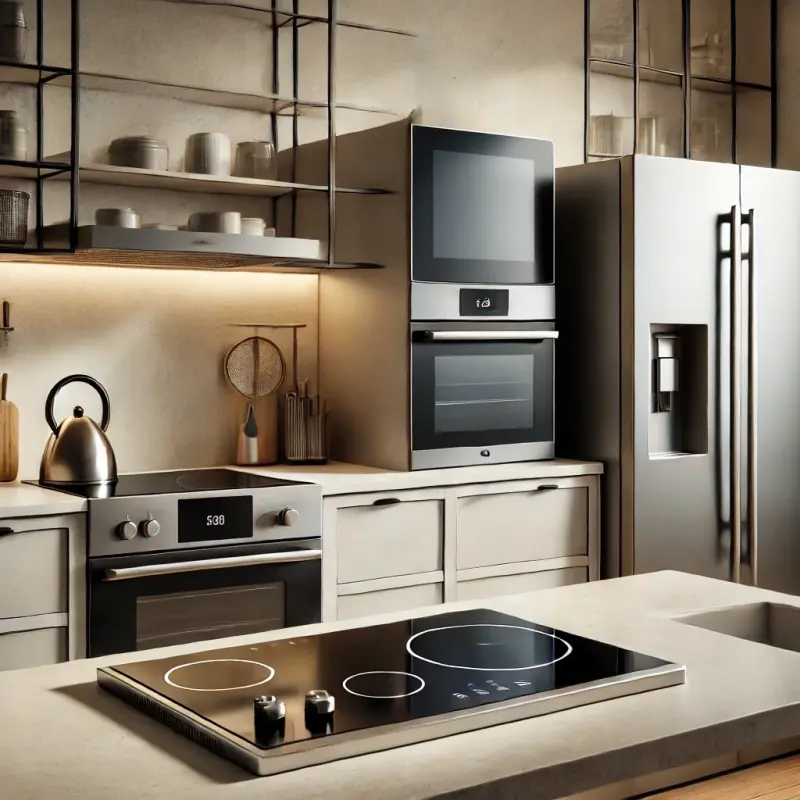Kitchen of Tomorrow: How Smart Devices Will Revolutionize Cooking
In the last decade, smart home technology has taken the world by storm, and one of the most exciting frontiers is the kitchen. This room, once dedicated to traditional cooking methods, is rapidly evolving with the integration of cutting-edge technology. From refrigerators that can track food inventory to ovens that can automatically adjust temperature for perfect results, the future of cooking promises greater convenience, efficiency, and creativity. Let’s explore how these advancements are shaping the kitchen of tomorrow.

The Rise of the Smart Kitchen
Smart kitchens encompass a wide range of devices that use internet connectivity, artificial intelligence (AI), and advanced sensors to streamline and elevate the cooking process. These technologies are designed to anticipate user needs, make cooking safer, and minimize food waste. Here’s how:
-
Smart Refrigerators: No longer just a place to store food, smart refrigerators are now able to track expiry dates, recommend recipes based on available ingredients, and even place grocery orders. They can alert you when milk is running low or when the leftovers you forgot about are approaching their use-by date. Some models even feature touch screens that serve as the central hub for kitchen management, complete with family schedules, weather updates, and entertainment options.
-
Voice-Activated Assistants: Whether it’s Alexa, Google Assistant, or another platform, voice control is becoming a staple in the modern kitchen. You can ask for recipe suggestions, set timers, or even adjust the temperature of your oven without lifting a finger. This hands-free convenience is particularly useful for multitasking chefs or when handling messy ingredients.
-
Smart Ovens and Cooktops: Precision cooking is no longer limited to professional chefs. Smart ovens and cooktops come with features like built-in cameras, remote control via smartphone, and automatic temperature adjustments. For example, if a recipe calls for broiling at the end, the oven can sense when your dish is nearly done and switch modes automatically. This ensures that meals are cooked to perfection with minimal user input.
-
AI-Powered Meal Planning: Artificial intelligence is taking meal planning to a new level. By analyzing dietary preferences, nutritional goals, and the food inventory in your kitchen, AI platforms can suggest meals, generate shopping lists, and even help you stick to a budget. Some systems can also monitor trends in your eating habits and recommend healthier alternatives.
-
Smart Dishwashers and Food Disposal: Cleaning up is getting smarter too. New dishwashers feature advanced sensors to detect the level of dirtiness on dishes and adjust the wash cycle accordingly, ensuring optimal water and energy usage. Additionally, waste management is being tackled with intelligent composting systems that help break down organic waste more efficiently.
The Advantages of a Connected Kitchen
The integration of smart devices into the kitchen comes with numerous benefits:
-
Time-Saving Convenience: With pre-programmed settings and remote operation, you can start dinner while on your way home from work or get a head start on meal prep. These devices allow for multitasking and reduce the time spent monitoring the cooking process.
-
Energy Efficiency: Smart appliances often come with energy-saving features that optimize power consumption. For example, induction cooktops only heat the cookware itself rather than the surrounding surface, making them more efficient than traditional stoves.
-
Reduced Food Waste: With refrigerators that can track food and remind you to use ingredients before they spoil, and AI systems that suggest meals based on what’s already in your kitchen, food waste can be significantly minimized.
-
Enhanced Safety: Safety features like automatic shut-off, child-lock mechanisms, and alerts for gas leaks or overheating make these kitchens safer environments. Some devices are equipped to send alerts to your phone if a potential hazard is detected.
Challenges and Considerations
Despite the many advantages, smart kitchens do come with their own set of challenges. One of the main concerns is data privacy. Since these devices often collect and store information about user habits, ensuring that this data is secure and not shared without consent is crucial. Additionally, there is the issue of cost. High-tech appliances can be expensive, and integrating multiple devices into a cohesive system might not be affordable for everyone.
Furthermore, the rapid pace of technological change can make devices quickly outdated. It’s important to consider whether a particular gadget offers long-term value or if it will need constant upgrading.
What’s Next for Kitchen Technology?
The future promises even more integration and sophistication. We are likely to see:
- Automated Meal Prep Robots: Machines that can chop, dice, and prepare ingredients autonomously could soon become household staples.
- Smart Food Printers: While still in its early stages, 3D food printing could revolutionize meal preparation, offering customization at the molecular level.
- Personalized Nutrition: Wearable health monitors could sync with your kitchen devices to recommend meals tailored to your nutritional needs and fitness goals.
The ultimate vision for the smart kitchen is to create an ecosystem where every appliance communicates seamlessly, making cooking an enjoyable, efficient, and sustainable activity.
In the years to come, the kitchen will not just be a place to prepare food but a hub of innovation that caters to our individual tastes and lifestyles. As technology continues to evolve, our approach to cooking will be transformed in ways that are both practical and inspiring.
Articles
Sign up for our alerts to get the most recent and engaging articles delivered straight to your email.